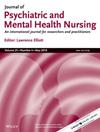Users remain overlooked: Shared decision-making processes for people with anxiety disorders
Abstract
What Is Known on the Subject?
- Patients do not always receive enough information about their diagnosis and their perceived participation in decision-making about their treatment is low.
- Some participants reported feeling very uncertain when the physician invited them to choose between these options. Others users expressed their satisfaction with the trend away from paternalistic attitudes in the health system.
- There is a trend towards pharmacological prescription as a first approximation. This contrasts with the recommendations of scientific organizations based on evidence and cost-effectiveness studies on the offer of psychological interventions as the first option.
- The user groups pointed out that active coping, based on exposure to anxiety-generating situations, made a significant contribution to alleviating their anxiety disorders. However, some of those interviewed rejected this type of intervention.
What the Paper Adds to Existing Knowledge?
- Users diagnosed with anxiety disorders miss more information about the disorder and participation in its treatment.
- Opposite positions coexist in terms of participation in the choice of treatment.
- Pharmacological treatment is most commonly the first option offered.
What Are the Implications for Practice?
- This study is an example in itself of the involvement of users in the healthcare process, and therefore placing them at the centre of attention, as reflected in healthcare policies and clinical practice guidelines.
- It promotes the identification of needs that users diagnosed of anxiety disorders may have, with the aim of putting in place, from healthcare professionals and health services, the necessary supports adapted to these.
- Mental health nurses are well-positioned to offer support and guidance during the process of involvement and shared decision-making.
Introduction
An essential aspect of mental health treatment and recovery is the degree of involvement by health service users in the process.
Aim/Question
Explore the values, demands and preferences of persons diagnosed with anxiety disorders, their participation in the treatment provided, and the response of the health system in this regard.
Methods
A qualitative study was conducted, with 51 participants. Nine focus groups and four in-depth interviews took place.
Results
Three broad categories were identified: (1) diagnosis; (2) treatment options offered and shared decision-making; and (3) coping with the disorder. Sometimes patients do not receive enough information to cover their needs. A trend towards drug prescription as a first approach was observed, while active coping based on exposure to anxiogenic situations was indicated as the most effective option.
Conclusion
Shared decision-making is a necessary aspect of treatment, and the therapeutic process should be adapted to match the service user's preferences, values and needs.
Implications for the Practice
This research identifies the needs of patients diagnosed with anxiety disorders and promotes, therefore, from healthcare professionals and services, the provision of measures to meet these needs.

 求助内容:
求助内容: 应助结果提醒方式:
应助结果提醒方式:


